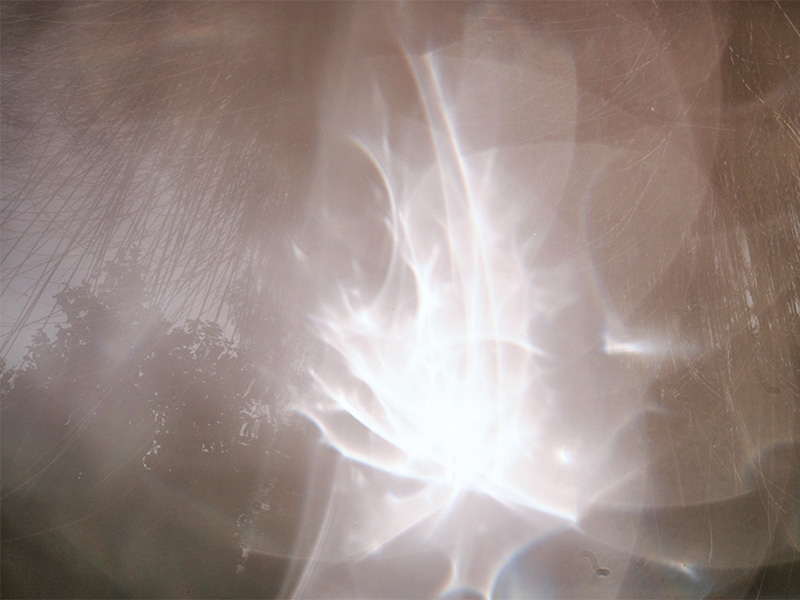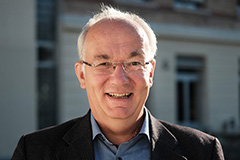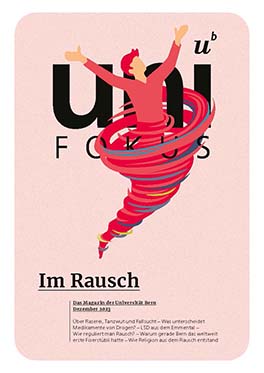Science of Religion
“Intoxication led to the first religious communities”
In the early days of mankind, shared states of intoxication helped individuals to form collectives, says Jens Schlieter, who studies the connection between religion, drugs and intoxication. Can intoxication still be of help today?

Jens Schlieter: My interest was sparked by descriptions of near-death experiences. Many near-death experiences have been made in states of intoxication. In his first self-experiment with LSD, its discoverer, the Swiss chemist Albert Hofmann, had the impression that he was hovering in an intermediate space between life and death. In further experiments, he reached a state of profound happiness which led him to maintain throughout his life that such conditions should be permissible for interested, intellectually oriented people for the purposes of self-exploration or psychotherapy. The fact that what people report in near-death experiences as visions is also reported in drug-induced intoxication compelled me to research the connection between religion and psychoactive substances.
How do intoxication and religious visions relate?First of all, I am interested in whether people who are completely without religious socialization actually have intoxicated visions which are spiritually significant. Children and young people who are socialized in visionary religious communities talk about emotionally intense experiences of excessive happiness, of changed perceptions or of being completely absorbed in a situation, without having taken psychoactive substances. I assume that spiritually oriented people who have a positive memory of this could use more psychoactive substances later on in life in order to get back to these previously experienced states. John C. Lilly, an American physician and spiritual neo-shaman, recounts in his autobiography that under LSD he was reminded of his pious Catholic youth and felt like he was kneeling down in a church to feel close to the Divine as he did then. For him, the mystical experiences of his youth were the starting point for being able to classify his intoxication experience.
“States of intoxication have been sought to keep reality at bay since time immemorial.”
Jens Schlieter
How can an intoxication experience be distinguished from reality?The intoxication results in spectacular effects such as altered perception of space and time, hallucinations and visionary deceptions. In contrast to this, I would start from a concept of reality that describes reality as the overpowering, to which humans must relate. The American science fiction author Philip K. Dick has defined reality as follows: “Reality is that which, when you stop believing in it, doesn't go away.” States deviating from the perception of reality are defined in the difference to everyday consciousness. In this, we depend on us all having a similar experience of day-to-day life, for example in terms of coordinating work processes, appointments, etc.
What good is it for a person to leave their everyday consciousness?Experiences of intoxication are seen as a method of leading us into the depths of the world and our own person. At the same time, states of intoxication have been sought to keep the often overpowering reality at bay since time immemorial. Certain religious processes have similarities here. After all, they too strive to overcome the everyday. Religion and intoxication can articulate a longing – on the one hand to advance into unknown realms and, on the other, to distance oneself from emotions determined by finiteness.
Subscribe to the uniAKTUELL newsletter

Discover stories about the research at the University of Bern and the people behind it.
The French sociologist Emile Durkheim assumed that the intoxication experience could be described as a collective frothing. In early times, states of intoxication led to a community losing its sense of being a collection of individuals and becoming a collective whole. In the experience of a collective intoxication, the community feels emotionally connected. This is important for the formation of a common identity. Durkheim considered communities that were able to do this better able to survive in the early stages of human development.
Is the formation of religious communities connected with visionary intoxication?People have probably always taken psychoactive substances. Early occurrences of the consumption of psilocybin mushrooms and peyotecacti are known in North America. In the animal world too, you will see examples of animals, such as chimpanzees in Guinea, getting intoxicated on fermented palm juice. If the hypothesis is correct that the practices of shamans in the early human history of Eurasia are the oldest tangible religious practices, then intoxicants may have played a role here as well. Among other things, cave paintings show that shamanizers undertook soul journeys. Those involved in the intoxication believed that they were changing into birds, for example, in order to come into contact with positive and negative forces, in order to ultimately ward off disease from the community. Or to heal individuals. Because at this stage of human development there was no understanding of everyday life, but only one big world, both the miraculous and threatening sides of intoxication were an expression of this world, which also included overpowering events such as earthquakes.
What are the earliest descriptions of intoxication as sources?In Indian tradition, soma, both a drink and a deity, is described in the songs of the Rigveda, some of the oldest Indian tales. In these chants, psychedelic states of intoxication are clearly described with great precision. In one song, an intoxicated person says that after drinking soma he flies and spreads his wings, one of them touching the earth, the other the sky. It is clear from the description that it was obvious that this state was due to the substances added to the drink. What is interesting is that this effect has a religious connection. The soma drink is understood as the Divine, and its ritual use means taking in this Divine power.
About the person

Jens Schlieter
studied Philosophy, Comparative Religious Studies, Tibetology and Buddhism in Bonn and Vienna. Since June 2009 Associate Professor of Systematic Science of Religion at the University of Bern. Among other things, he focuses on the history of ideas and ethics of Buddhism, the theory of religion and the theory of extraordinary experiences.
Yes, in addition to the effects mentioned above, a very important aspect of psychoactive substances is that they change our emotionality. Many become very receptive to music, especially rhythmic music. It is probable that in the early phase of religious development, human emotionality was deepened by the intoxication effect. And that these demarcating and isolation-reducing effects have contributed significantly to the religious world view of a group. Today’s psychotherapists also focus their attention on changing emotionality. They want to use psychedelic substances in the hope that, for example, blocked traumatic experiences can be relived again, but without the accompanying emotionality, so that states can be reached in which people, under controlled substance administration, are able to discuss and repeat memories without succumbing to retraumatization.
Does the accompanied use of LSD or other psychedelics in psychotherapy tie in with religious beliefs?Many religious or philosophical teachings associate wisdom with knowing oneself as precisely as possible. This includes taking a look at yourself as if from the outside and finding out how anger or annoyance arises. If you are able to observe the development phase of these feelings within yourself closely, you can try to control these processes. And at a point when it is still possible to interrupt negative feelings, because the very first signs of this process have become visible. This is achieved by the subjective slowing of time in order to avoid automated responses to processes over which you no longer have control. In a psychedelic state of intoxication, there are many people who can apparently devote themselves to such intense self-observation. The processes seem to be so slow that it is easier to observe the development of feelings and perceptions. In Asian cultivation practices, certain meditations serve this purpose, but without the use of substances.
Are there religions that do not attribute any positive effect to intoxication?Buddhism with its five commandments that every lay Buddhist, and particularly monks and nuns, must adhere to, is a tradition critical of intoxicants. One is not to consume intoxicating drinks. However, in the Buddhism of the Tantric tradition, the use of intoxicants in cult contexts has been permitted. Alcohol was banned in Islam early on. The Koran contains passages critical of alcohol, but on the other hand passages in which wine is appreciated. Alcohol, however, was usually considered disinhibiting and impure, especially in the context of prayers. During the Ottoman period, there was an increased consumption of opium and hashish. Such psychoactive substances have often been used ceremonially, specifically in order to bring about an encounter with God or the Divine. These, in contrast to alcohol, have less of an impact on the observing consciousness and the ability to remember.
Why is wine so present in Christianity?In Christian religion, wine was associated with social festivals from an early age. The first miracle of Jesus, turning water into wine, took place in the context of a rousing festival and thus indirectly giving alcohol a positive connotation. The Christian conversion ceremony with wine as the blood of Christ bears witness to this. Since early times, wine has been highly valued in various monotheistic traditions, but also viewed critically as triggering aggression. In the Christian tradition, ascetically oriented church fathers and the reformers Luther and Zwingli were critical. Interestingly, however, the characteristic of addiction or dependence was not considered to be decisive, perhaps because the religious use of alcohol in ritualized use during festive seasons was clearly different from everyday use and thus addiction occurred less frequently.
Could liberalized drug use lead to the re-establishment of religious groups?Due to advancing individualization and secularization, I would not assume that today intoxicants and intoxicating states are at the core of new community formations. Because individualization in society has gone too far, and we know from the pharmacological research of psychoactive substances that there are a whole range of intoxication effects, probably much more so than in the early days.
Could you go into more detail on that?The effects of intoxication are so varied in increased individualism that the establishment of communities solely based on the consumption of intoxicants no longer seems possible. Intoxication is much more likely to be used for educational or exploratory purposes in communities that already exist. But in our society the effect of intoxication can be seen as more centrifugal, also narcotic and isolated, as in the opioid crisis in the USA. And not as bundled as it was in the early days. Since the 1960s, people have been using psychedelic intoxication to search for insights into and about themselves, or for aesthetic, artistic inspiration or an intense sense of happiness. In Western societies, this desire for intoxication is therefore more to be understood as an expression of a search for individual ways of life – or, more recently, as a means of restoring mental health in the form of therapeutic support.
Magazine uniFOKUS

Subscribe free of charge now!
This article first appeared in uniFOKUS, the University of Bern print magazine. Four times a year, uniFOKUS focuses on one specialist area from different points of view.